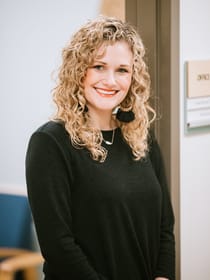Eating Recovery Center - Texas Christian University

Location Details
Eating disorder treatment for TCU students in Fort Worth, TX
If you're struggling and experiencing unhealthy thoughts about your weight, body or relationship with food, you don't need to put your life on hold to get the care you need.
TCU students can now access convenient eating disorder treatment in one of two ways:
- Join our virtual eating disorder treatment program and explore recovery online with other students. Students pursue recovery with peers from other schools while maintaining their coursework and extracurricular activities.
- Attend our in-person intensive outpatient program (IOP) at Eating Recovery Center Fort Worth, just five minutes from the TCU campus.
In both programs, students receive ongoing nutrition education and support, partake in nutrition and therapy sessions, and engage in therapeutic process groups. Learn how to navigate life's stressors and challenges while still in school.
Lighting your way to recover from eating disorders
Here, you always belong
TCU places a great value on mental health, with multiple peer support communities on campus. ERC’s IOP fits in seamlessly with groups already on campus.
Find a safe and comforting space
Entering eating disorder treatment is a big step. Our programs, conveniently accessed virtually or in person, help to ease your worries, with support from professionals and your peers.
Connect with a recovery community
Participants have reported that our program feels like “home.” We work closely with TCU’s counseling center to ensure quality care for students.
Getting started with eating disorder treatment
Eating disorders are serious illnesses that can take over you or your loved one’s life. Reaching out for help is important and brave. If you are interested in learning more about treatment, we invite you to reach out to our team today.
- Admission into the program is ongoing.
- Individuals may join the program at any time.
- No referral is ever needed for you to access the care you need and deserve.
Insurance coverage at TCU
Eating Recovery Center is in network with United Healthcare, who administers the student health insurance plan at TCU. If you have questions about whether treatment is covered by your insurance plan, please contact us. Our compassionate insurance verification experts are standing by to support you, to answer your questions and check your benefits coverage.
Hear from our executive director
College is such a transformational time in a person’s life. Making a commitment to eating disorder recovery will benefit you and equip you to be present in whatever it is you want to do with your life, positioning you to be able to accomplish your dreams.
With full support available to you both online and in person, a full recovery is possible.

Multiple recovery options for college students in Fort Worth
Our virtual eating disorder treatment program is designed to fit seamlessly into a college student's everday life. If you would prefer an in person eating disorder treatment program, we invite you to explore our intensive outpatient program near campus.
Eating Recovery Center Fort Worth is located five minutes from the TCU campus at our brand-new location on South Hulen Street. Here, you'll find nutritious meals, meal planning, meal support and integrated therapies to help you heal.
Conditions We Treat
-

Eating Disorders
An eating disorder is a treatable mental illness that includes a number of different symptoms, including extreme emotions, attitudes, and behaviors surrounding weight and food issues.
-

Anorexia
Anorexia nervosa is characterized by an obsessive fear of weight gain and a refusal to maintain a healthy body weight.
-

Atypical Anorexia
You can’t tell if someone has an eating disorder just by looking at them. See how atypical anorexia affects people in a variety of body shapes and sizes.
-

ARFID
ARFID is a lesser known eating disorder that frequently begins as early as infancy or childhood, but adults can also suffer.
-

Binge Eating Disorder
Binge eating disorder is characterized by frequent overeating – at least once a week for three months – combined with a lack of control, intense feelings of distress and several other characteristic behaviors.
-

Bulimia
Bulimia is characterized by patterns of bingeing and purging.
-

Compulsive Overeating
Compulsive overeating can involve binge eating and weight gain, but it can also involve other behaviors.
-

Diabulimia
The term diabulimia is used to describe the diagnosis of an eating disorder in an individual with type 1 diabetes. These patients intentionally misuse insulin for weight control.
-

OSFED
Some eating disorders do not meet all of the diagnostic criteria for specific diagnoses like anorexia nervosa and bulimia nervosa.
-

Orthorexia
Some people go to extremes to “eat clean” at all times. This may lead to a disordered eating pattern known as orthorexia.
Levels of Care Offered
-

Intensive Outpatient Treatment
Our intensive outpatient program is a flexible mood, anxiety, and eating disorder treatment program that allows patients to work or go to school during the day and sleep at home at night.
-

Virtual Intensive Outpatient - Eating Recovery At Home
ERC is removing the barriers that can keep patients with anorexia, bulimia, and other eating disorders from receiving treatment. Through telebehavioral health programming, Eating Recovery At Home (our virtual Intensive Outpatient Program) offers the same proven care as our in-person treatment centers.
We will meet you where you are
Eating disorders are on the rise, with a substantial increase of eating disorders in college students from 15 percent to 28 percent between 2013-2021. The pressures of academic life can cause college students to experience unhealthy thoughts about their weight, body image, and relationship with food.
This is why Eating Recovery Center provides compassionate, individualized care for eating disorders and co-occurring mental health conditions for college students around the country.
If you are looking for support, choose the program that's right for you:
- Virtual eating disorder treatment with other college students
- In-person eating disorder treatment nearby in Fort Worth
What is IOP eating disorder treatment like?
In ERC's IOP programs, you will work with the same experienced care team each week, including a licensed mental health clinician, registered dietitian and care coordinator, in a cohesive treatment model that fosters connection.
Process groups, body image groups and other therapeutic groups flow from week to week with dedicated themes. Treatment supports the whole person, skill-building and empowerment to help you maintain recovery.
- Group sessions take place for three hours per day, three days per week
- Participate in weekly individual therapy sessions and dietary sessions
Find ongoing nutrition support
Nutrition support is a major part of eating disorder recovery. Our goal is to help each individual get their relationship with food to the place they want to be.
In IOP, participants will meet individually with a registered dietitian once a week and enjoy supported group meal sessions three times a week.
Our clinicians provide customized support for each individual since eating disorder treatment is not a one-size-fits-all approach.
Find Recovery with Evidence-Based Therapies
Testimonials
Get matched with the exact support you need.
With one conversation, our mental health professionals will help you better understand what you’re going through and what you need.
We will meet you where you are, listen to your story in a therapeutic setting, and match you with the level of support that meets your struggle.
Covered by Most Commercial Insurance Plans
Our patient access team is here to advocate for you. We can help you address financial challenges and work with you to get you the maximum coverage offered by your plan.
Who We Treat
-

Children & Adolescents
We can help guide you and your child on a path to long-lasting change and healing.
-

Adults
We provide eating disorder treatment and mood and anxiety disorder treatment for all genders ages 18 and older.
Helping families each step of the way
We promote family involvement in treatment from the time an individual starts treatment all the way through discharge and aftercare. Access our robust family programming today, including:
- Virtual Family and Friends Education Series
- Ongoing free, virtual caregiver support groups
- Hope Orientation
- Optional family therapy sessions if the patient chooses
Access ongoing support long after treatment ends
Our support continues long after you leave treatment. When you discharge from care, one of our alumni outreach team members will be contacting you regularly by phone and email. We will continue to send you resources, including inspirational stories, tips and videos, to help you stay focused on eating disorder recovery for the long-term. We can also help you coordinate care to set up ongoing nutrition and therapy support, whether on- or off-campus.
FAQ
-
Why should college students choose an IOP?
Intensive outpatient eating disorder programming empowers students to take ownership of their recovery and become active participants in their lives. There is a strong focus on building rapport among participants, and continued contact to promote trust, security and safety. Programming incorporates various therapeutic modalities including acceptance and commitment therapy (ACT), cognitive-behavioral therapy (CBT), and more – in addition to core recovery principles of mindfulness and connectedness. Programming includes nutritional counseling, individual therapy, supported meals and more. Additionally, this is the only program of its kind in Fort Worth, TX.
-
What is the IOP at TCU like?
This program is led by experts from Eating Recovery Center – including a therapist and dietitian– who provide individualized care to students, in addition to group therapy among peers with similar challenges and goals. Built upon ERC’s traditional ‘pod’ model, the therapist and dietitian work together to lead peer processing groups and individually treat students. Our overall aim is to enable students to continue their classes, campus activities and social life without interruption. With the exact same program and quality of care that you would receive in any of our treatment centers, students can conveniently access effective eating disorder treatment virtually.
-
How long does the program last?
Most participants find that eight weeks is the appropriate amount of time for treatment. However, some individuals may need more or less time. You may also re-enroll in the program if you find that you need more support after you discharge.
-
How do I get started?
There are multiple ways to learn more about the IOP at TCU. If you are interested in the program, we invite you to schedule an assessment with one of our mental health professionals. We will ask questions, listen to your answers and get to know you as a whole person – outside of your struggle. There is zero cost, zero commitment, zero pressure and zero judgment.
-
What support is offered for caregivers, family members and friends?
We offer numerous ways for caregivers, family members and friends to be involved in their loved one’s treatment. We invite loved ones to participate in the following offerings:
-
Is virtual IOP as effective as in-person treatment?
Yes, our virtual intensive outpatient program is as effective as in-person treatment and fits seamlessly into students’ everyday life. In our program, TCU students will interact online with other area college students who are living similar shared experiences. With group therapy, individual therapy, family therapy and nutrition counseling, our virtual IOP helps college students with eating disorders achieve lasting recovery from anywhere.
Meet the Team




Hide Last Child Layout Div
custom list styles
mobile menu
billboard list
#who-we-treat, #conditions, #levels-of-care javascript
Show Who We Treat, Conditions, Levels of Care
















